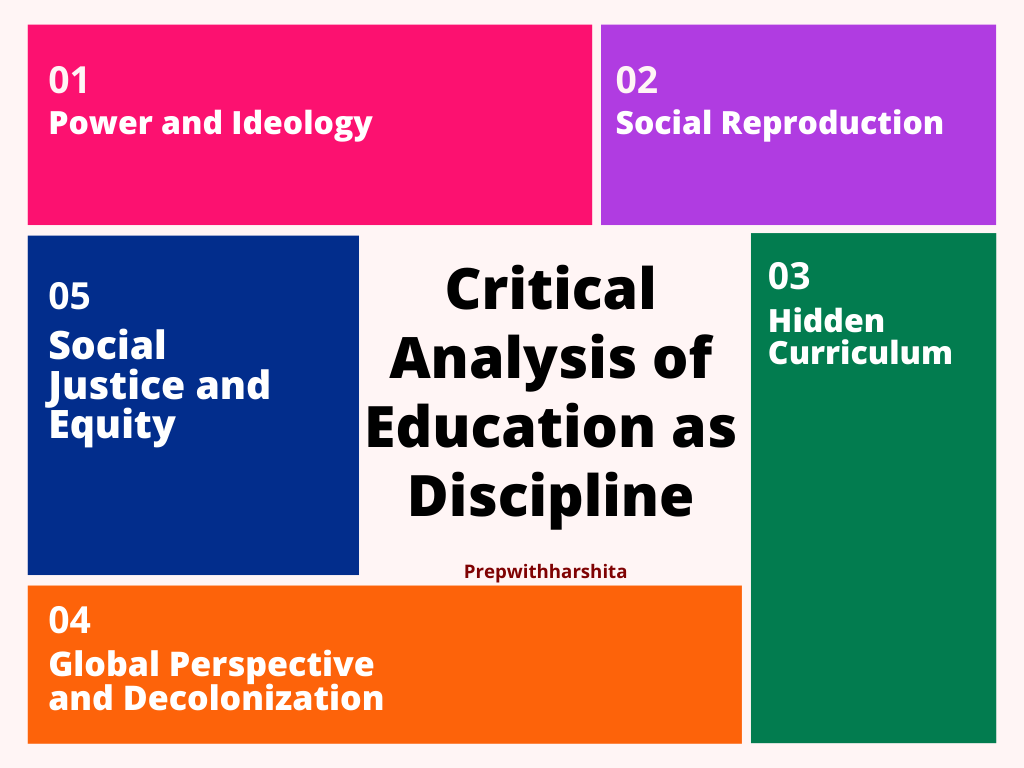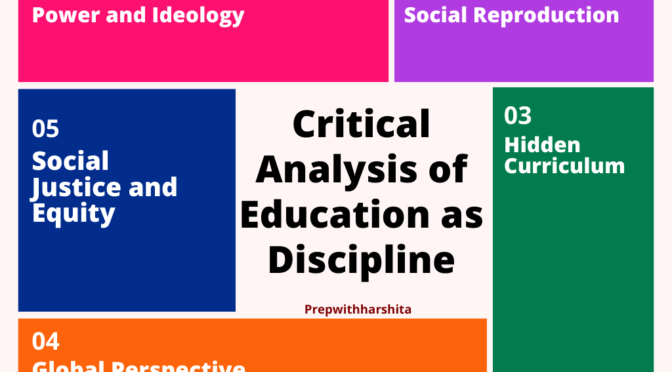Critical analysis of education as a discipline or area of study involves examining its theoretical foundations, methodologies, practices, and societal implications.
Here is a detailed exploration of the critical aspects of education as a discipline:
- Power and Ideology: A critical analysis of education recognizes that educational systems are embedded in power structures and ideological frameworks. Education can perpetuate social inequalities by reproducing existing power dynamics, cultural norms, and dominant ideologies. Critical scholars explore how education can be used as a tool of social control, reinforcing unequal social, economic, and political systems.
- Social Reproduction: Education is often seen as a means of reproducing social structures and inequalities. Critical analysis questions how educational systems perpetuate social hierarchies, reproduce privilege, and limit social mobility. It examines how educational practices can reinforce existing social divisions based on factors such as class, race, gender, and ethnicity.
- Hidden Curriculum: Critical analysis focuses on the hidden curriculum, which refers to the implicit messages, values, and norms conveyed in educational settings. It explores how educational institutions transmit social and cultural biases, promote conformity, and shape students’ beliefs, attitudes, and behaviors. This analysis encourages an examination of the hidden curriculum’s impact on students’ identities, worldviews, and agency.
- Neoliberalism and Marketization: Critical scholars examine the impact of neoliberal ideologies and market forces on education. They critique the marketization of education, which commodifies knowledge, promotes competition, and prioritizes economic outcomes over holistic development. This analysis explores how privatization, standardized testing, and accountability measures can undermine the democratic and social purposes of education.
- Social Justice and Equity: Critical analysis emphasizes the pursuit of social justice and equity within educational systems. It examines how education can challenge oppressive structures, promote inclusive practices, and empower marginalized individuals and communities. Critical scholars analyze the barriers to equity, such as discriminatory policies, cultural biases, and inadequate resources, and propose transformative approaches to address these issues.
- Pedagogy and Transformative Learning: Critical analysis focuses on pedagogy and learning practices that promote critical thinking, reflection, and social transformation. It explores alternative educational approaches that encourage students to question dominant narratives, challenge social injustices, and become active agents of change. This analysis recognizes the importance of student-centered and participatory approaches that empower learners to engage with complex social issues.
- Intersectionality and Multiple Identities: Critical analysis in education acknowledges the intersectionality of multiple identities and explores how they intersect with educational experiences. It examines how race, gender, class, sexuality, and other social categories intersect to shape educational opportunities and outcomes. This analysis encourages understanding and addressing the unique challenges faced by individuals with intersecting identities within educational settings.
- Global Perspectives and Decolonization: Critical scholars in education examine the impact of colonial legacies on educational systems and seek to decolonize knowledge and pedagogy. They explore diverse cultural perspectives, challenge Eurocentric curricula, and promote intercultural understanding. This analysis recognizes the importance of contextualizing education within global frameworks and fostering dialogue among different knowledge systems.
- Research and Methodological Critique: Critical analysis of education also extends to research methodologies and paradigms. It questions dominant research approaches, encourages reflexivity, and advocates for participatory, emancipatory, and critical research methods that challenge power imbalances and give voice to marginalized communities.
A critical analysis of education as a discipline seeks to unveil underlying power structures, question dominant ideologies, and propose alternative visions of education that prioritize social justice, equity, and transformative learning.
It encourages educators, policymakers, and researchers to critically reflect on their practices and work towards a more inclusive, equitable, and liberating educational system.
Also Read: Education as a socially Contrived System

Also Visit: Prep with Harshita


18 thoughts on “Critical Analysis of Education As a Discipline”